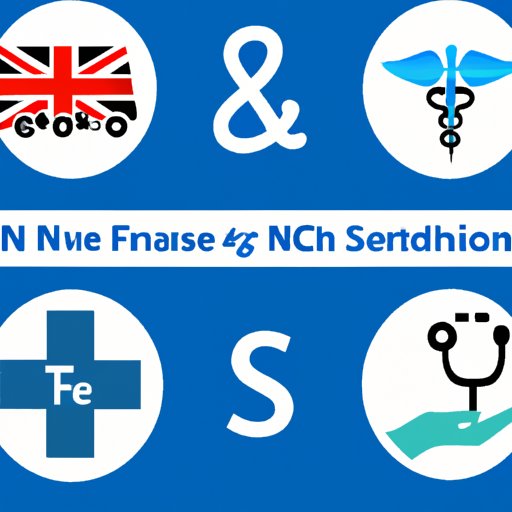
Introduction
When it comes to healthcare, many people wonder if they can get free healthcare in the UK. The answer to this question is both yes and no—it depends on certain factors. Healthcare is largely free in the UK thanks to the National Health Service (NHS), but there are some limitations. In this article, we’ll explore the role of the NHS in the UK healthcare system, the pros and cons of free healthcare, common misconceptions about free healthcare, the impact of Brexit on healthcare, and the possibilities and limitations of UK healthcare in the future.
The Current State of Healthcare in the UK
The NHS is a government-funded healthcare service that provides free healthcare services to all UK citizens and legal residents. The NHS was formed in 1948 and is funded by taxes, including National Insurance contributions, income taxes, and business taxes. The funding model of the NHS means that everyone benefits from the healthcare services and no one is denied healthcare due to an inability to pay.
Despite some challenges, the NHS has been largely successful in providing healthcare services in the UK. In fact, in a 2018 report by the Commonwealth Fund, the UK healthcare system was ranked as the best healthcare system among 11 countries, including Australia, Canada, France, Germany, the Netherlands, New Zealand, Norway, Sweden, Switzerland, and the United States.
The Pros and Cons of Free Healthcare in the UK
One of the biggest advantages of free healthcare is that it ensures everyone has access to healthcare services, regardless of their financial situation. This means that people don’t have to worry about choosing between receiving the medical care they need and falling into financial hardship. Additionally, free healthcare can promote preventative healthcare and early intervention, which can save lives and reduce the need for more complex and expensive treatments.
However, providing free healthcare services to everyone comes with some drawbacks and challenges. The main challenge is that healthcare is expensive, and providing it for free can put a strain on the government and taxpayers. The government must continually balance the cost of providing healthcare services with other budget priorities, such as education and national defense.
Debunking Common Misconceptions About Healthcare in the UK
There are some common misconceptions about the NHS and free healthcare in the UK. One common myth is that the NHS is a perfect system that can provide care without error. However, like any healthcare system, the NHS has its challenges, such as long waiting times for certain non-urgent treatments and staff shortages.
Another common myth is that the NHS provides care only to UK citizens. However, the NHS provides care to anyone who is resident legally in the UK, regardless of their nationality or citizenship status. Finally, people often assume that free healthcare means they can receive any treatment they want, regardless of their medical condition or necessity. However, the NHS is a publicly funded system and must make choices about which treatments it can provide based on cost and effectiveness.
The Impact of Brexit on the UK’s Healthcare System
The UK’s decision to leave the European Union has had significant impacts on the country’s healthcare system. One of the biggest impacts is the loss of EU healthcare workers. The UK has long relied on healthcare workers from the EU to fill key positions in the NHS, and the loss of these workers has left the NHS with significant staffing shortages. Additionally, Brexit has led to uncertainty around the future of funding for healthcare services, as the UK’s relationship with the EU is currently in flux.
The Future of Healthcare in the UK: Possibilities and Limitations
The future of healthcare in the UK is both exciting and uncertain. Advancements in medical technology and research hold promise for improving healthcare outcomes, but funding challenges and staffing shortages pose significant limitations.
One possible trend in the future of UK healthcare is the increasing role of technology. Technology has already begun to play a major role in areas such as medical research and telemedicine, and it is likely to continue to transform the healthcare industry in the coming years. However, there are limitations to the role of technology, such as concerns around privacy and access for those who lack digital literacy or the necessary technology.
Conclusion
In conclusion, healthcare is largely free in the UK thanks to the NHS, but this does come with some limitations. The NHS provides free healthcare services to all UK citizens and legal residents, but this comes with challenges, such as funding limitations and staffing shortages. Additionally, some common misconceptions about the NHS persist, such as the assumption that the NHS is a perfect system that provides care without error. Understanding the pros and cons of free healthcare in the UK, as well as the potential impact of Brexit and the possibilities and limitations of technology, can help people gain a more accurate understanding of the state of UK healthcare today. Those who have encountered problems with UK healthcare may benefit from seeking out additional resources or advocacy groups for more support.




